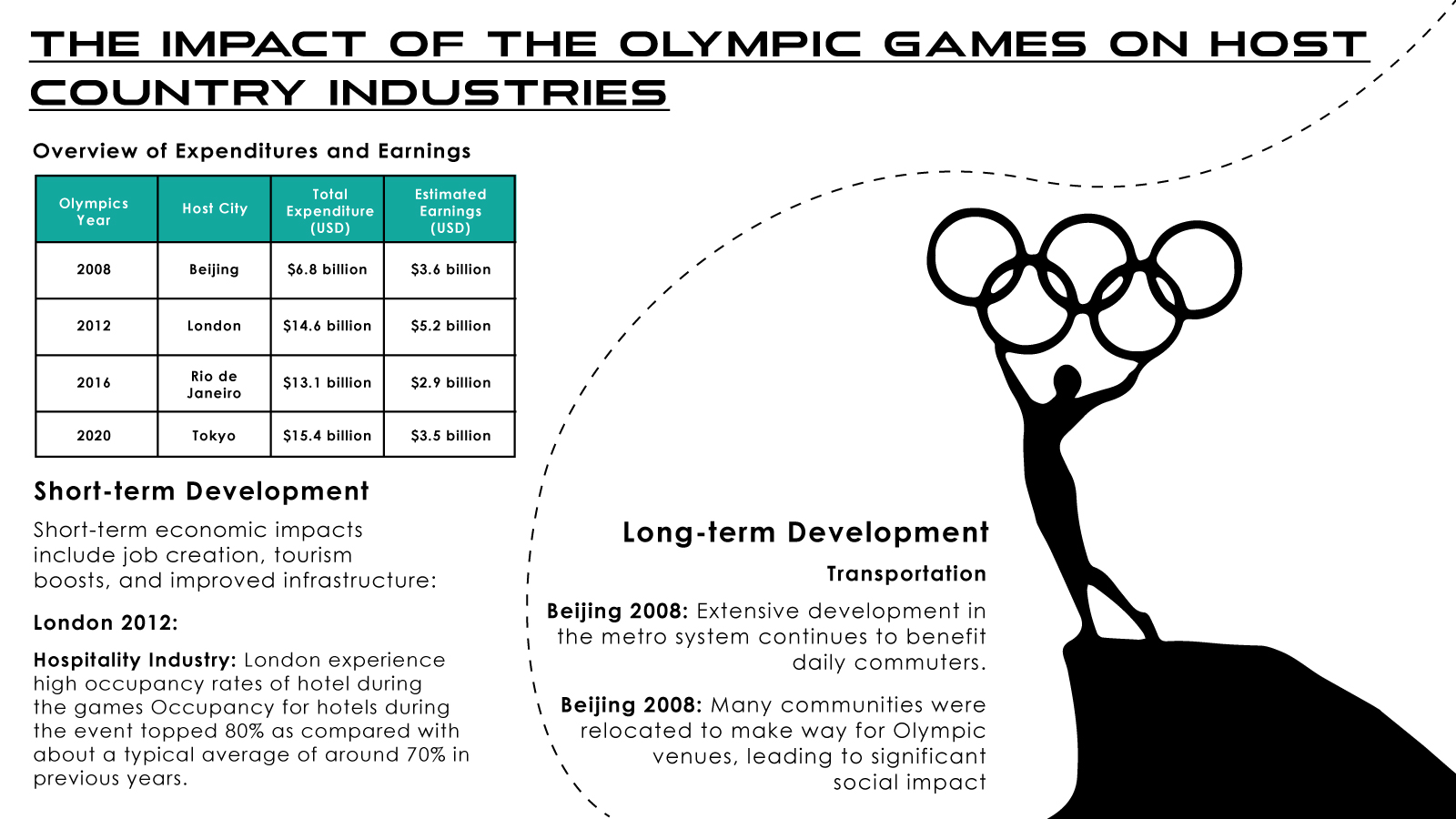
The selection of Olympic host is a tedious process. Usually, the interested country pitches their intention of becoming a host to the International Olympic Committee (IOC). After approval, the host is selected through a secret voting method. If we try to quantify the profit gained by the hosts in organising this event, we can see a superficial picture full of loss.
The following table represents total expenditure and earnings for last four events.
The numbers make us ponder over why countries are seek to become Olympic host despite the gap in earnings.
The games have cascading effect on the overall economy of the market. The influx of fundings, from local as well as foreign investors provide a long-lasting boost in employment and GDP. Some of the major affected sectors are discussed below:
Short-term economic impacts include job creation, tourism boosts, and improved infrastructure:
London 2012:
Hospitality Industry: London experience high occupancy rates of hotel during the games Occupancy for hotels during the event topped 80% as compared with about a typical average of around 70% in previous years.
Retail Sector: Retailers saw additional sales due to the Olympics, particularly those located in close proximity the venues. For example, foot-traffic figures showed an increase in visitor numbers at the Westfield Stratford City shopping center close to the Olympic Park by 15% during the Games.
Food and Beverage: Restaurant & cafe sales received a significant boost in London. For instance, a report revealed that food and beverage sales were up by 30% in key Olympic sites.
Tourism and Travel Agencies: Small local tour operators reported 20% more bookings to guide trips during the Olympics. Tourism revenues soared as well, owing especially to the arrival of an increasing number of foreign tourists.
Local Artisans and Markets: Street vendors and local markets experienced increased sales due to the higher number of visitors. Artisanal crafts and souvenirs saw a particular boost in sales, benefiting small-scale local businesses.
Temporary Employment: Increased demand for temp staff which created many jobs even if temporary thereby giving a valuable shot in the arm to local employment.
Tokyo 2020:
Technology Sector: The Games forced fast technology acceptance also driving a benefit for local tech companies Technology companies in Tokyo, meanwhile, experienced a surge in orders for health and safety products as bidders demanded more appropriate technologies such as Thermo Scan and contact-free payment systems..
Small Businesses: Local businesses, including convenience stores and small eateries, reported increased sales due to the influx of visitors and the overall heightened activity in the city during the Games.
Transportation
Beijing 2008: Extensive development in the metro system continues to benefit daily commuters.
Real Estate
Rio de Janeiro 2016: Many communities were relocated to make way for Olympic venues, leading to significant social impact.
Technology
PyeongChang 2018: The Winter Olympics showcased 5G technology, setting a new standard for technological integration in large-scale events.
The Olympics have a profound and multifaceted impact on host countries, influencing various industries both in the short and long term. Strategic planning is essential to maximize the benefits and mitigate potential downsides. Learning from past events, future hosts can better harness the economic and social opportunities presented by the Olympic Games.
Contact Us:
Akash Anand – Head of Business Development & Strategy
info@snsinsider.com
Phone: +1-415-230-0044 (US)
Hi! Click one of our member below to chat on Phone